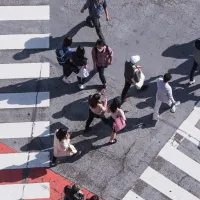Southampton experts developed a new survey to investigate whether international students would stay in the UK. The evidence prompted changes in official statistics and informed policymaking.
Professor Jackie Wahba reveals how our researchers did this.
The Office for National Statistics was concerned that it might be overestimating the number of international students overstaying their visas. Such data had been used by the UK Government to develop its immigration policies.
So its statisticians approached professors Jackie Wahba, Jane Falkingham and Corrado Giuletti at the Centre for Population Change, a multi-disciplinary research centre that works to inform policymaking. The team took on the task of conducting a survey of a representative sample of all graduating international students.
The first step was to develop a methodology that would fill potential gaps in existing migration statistics.
A survey of international students' intentions
The team asked international students about their intentions to stay or leave the UK after graduation, and how certain they were about this. The students’ actual decisions on whether to stay or leave the country were then captured 6 months later.
“Analysing longitudinal data – observing the same set of graduates twice – had not been done before,” Jackie says.
They got 3,500 responses from international students at over 50 universities in the UK. Most of those interviewed intended to leave the UK right after when they would graduate. Less than 10% planned to stay in the country and find a job. The next step was to investigate whether or not students’ plans to leave actually changed after graduation.
The research created a more reliable picture
The research findings showed that about 9 out of 10 students who had expressed the intention to leave the UK straight after graduating actually did leave. The team had confidence in the figures as they chimed with evidence from the Home Office’s checks on those leaving the country.
This ‘exit check’ data showed that only 4,600 international students overstayed their visa that year. This was a small fraction of the 100,000 figure the Government had previously suggested were overstaying.
The longitudinal research, put together with this other data, had created a more reliable picture of student migration than had been available before. This allowed the ONS to reach the conclusion that existing student net migration statistics were likely to be overestimates.

University research on migration continues
The outcome of the research was that the perception that many international students were overstaying was countered with evidence.
The Government statisticians committed to improving statistics on student migration, referring to the new survey in a code of practice. The Government requested a review that led to a new 2-year post-study work visa being announced in the run-up to the last General Election.
University research on migration continues. "I'm interested in temporary migration and the factors that trigger people to decide on a return migration," says Jackie. "I'm also looking at the implications of people planning to stay temporarily."









